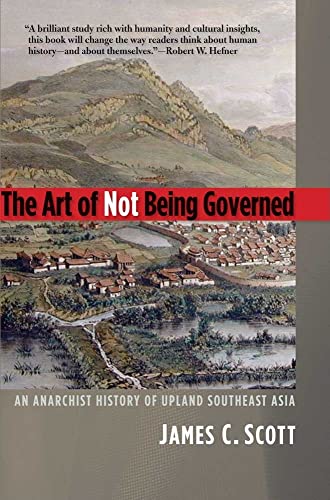Articles liés à The Art of Not Being Governed: An Anarchist History...

L'édition de cet ISBN n'est malheureusement plus disponible.
Afficher les exemplaires de cette édition ISBNLes informations fournies dans la section « Synopsis » peuvent faire référence à une autre édition de ce titre.
Les informations fournies dans la section « A propos du livre » peuvent faire référence à une autre édition de ce titre.
- ÉditeurYale University Press
- Date d'édition2010
- ISBN 10 0300169175
- ISBN 13 9780300169171
- ReliureBroché
- Nombre de pages464
- Evaluation vendeur
Acheter neuf
En savoir plus sur cette édition
Frais de port :
EUR 2,48
Vers Etats-Unis
Meilleurs résultats de recherche sur AbeBooks
Art of Not Being Governed : An Anarchist History of Upland Southeast Asia
Description du livre Etat : New. N° de réf. du vendeur 9219582-n
The Art of Not Being Governed: An Anarchist History of Upland Southeast Asia (Yale Agrarian Studies Series)
Description du livre Etat : New. Book is in NEW condition. N° de réf. du vendeur 0300169175-2-1
The Art of Not Being Governed: An Anarchist History of Upland Southeast Asia (Yale Agrarian Studies Series)
Description du livre Etat : New. New! This book is in the same immaculate condition as when it was published. N° de réf. du vendeur 353-0300169175-new
The Art of Not Being Governed: An Anarchist History of Upland Southeast Asia (Yale Agrarian Studies Series) [Soft Cover ]
Description du livre Soft Cover. Etat : new. N° de réf. du vendeur 9780300169171
The Art of Not Being Governed: An Anarchist History of Upland Southeast Asia (Paperback or Softback)
Description du livre Paperback or Softback. Etat : New. The Art of Not Being Governed: An Anarchist History of Upland Southeast Asia 1.25. Book. N° de réf. du vendeur BBS-9780300169171
The Art of Not Being Governed
Description du livre paperback. Etat : New. Language: ENG. N° de réf. du vendeur 9780300169171
The Art of Not Being Governed: An Anarchist History of Upland Southeast Asia (Yale Agrarian Studies Series)
Description du livre Etat : New. N° de réf. du vendeur I-9780300169171
The Art of Not Being Governed An Anarchist History of Upland Southest Asia An Anarchist History of Upland Southeast Asia Yale Agrarian Studies YUP
Description du livre PAP. Etat : New. New Book. Shipped from UK. Established seller since 2000. N° de réf. du vendeur GB-9780300169171
The Art of Not Being Governed (Paperback)
Description du livre Paperback. Etat : new. Paperback. From the acclaimed author and scholar James C. Scott, the compelling tale of Asian peoples who until recently have stemmed the vast tide of state-making to live at arms length from any organized state society For two thousand years the disparate groups that now reside in Zomia (a mountainous region the size of Europe that consists of portions of seven Asian countries) have fled the projects of the organized state societies that surround themslavery, conscription, taxes, corvee labor, epidemics, and warfare. This book, essentially an anarchist history, is the first-ever examination of the huge literature on state-making whose author evaluates why people would deliberately and reactively remain stateless. Among the strategies employed by the people of Zomia to remain stateless are physical dispersion in rugged terrain; agricultural practices that enhance mobility; pliable ethnic identities; devotion to prophetic, millenarian leaders; and maintenance of a largely oral culture that allows them to reinvent their histories and genealogies as they move between and around states.In accessible language, James Scott, recognized worldwide as an eminent authority in Southeast Asian, peasant, and agrarian studies, tells the story of the peoples of Zomia and their unlikely odyssey in search of self-determination. He redefines our views on Asian politics, history, demographics, and even our fundamental ideas about what constitutes civilization, and challenges us with a radically different approach to history that presents events from the perspective of stateless peoples and redefines state-making as a form of internal colonialism. This new perspective requires a radical reevaluation of the civilizational narratives of the lowland states. Scotts work on Zomia represents a new way to think of area studies that will be applicable to other runaway, fugitive, and marooned communities, be they Gypsies, Cossacks, tribes fleeing slave raiders, Marsh Arabs, or San-Bushmen. For two thousand years the disparate groups that now reside in Zomia have fled the projects of the organized state societies that surround them - slavery, conscription, taxes, corvee labour, epidemics and warfare. This book presents an examination of the huge literature on state-making. Shipping may be from multiple locations in the US or from the UK, depending on stock availability. N° de réf. du vendeur 9780300169171
The Art of Not Being Governed: An Anarchist History of Upland Southeast Asia
Description du livre Etat : New. 2010. Yale Agrarian Studies Series. Paperback. For two thousand years the disparate groups that now reside in Zomia have fled the projects of the organized state societies that surround them - slavery, conscription, taxes, corvee labour, epidemics and warfare. This book presents an examination of the huge literature on state-making. Series: Yale Agrarian Studies Series. Num Pages: 464 pages, 2 b/w illus. + 7 maps. BIC Classification: 1FM; HBJF; JFSL. Category: (G) General (US: Trade). Dimension: 237 x 158 x 32. Weight in Grams: 576. . . . . . N° de réf. du vendeur V9780300169171

